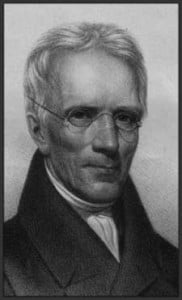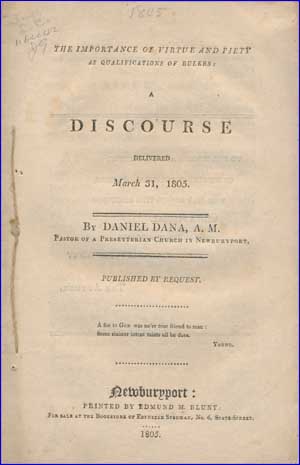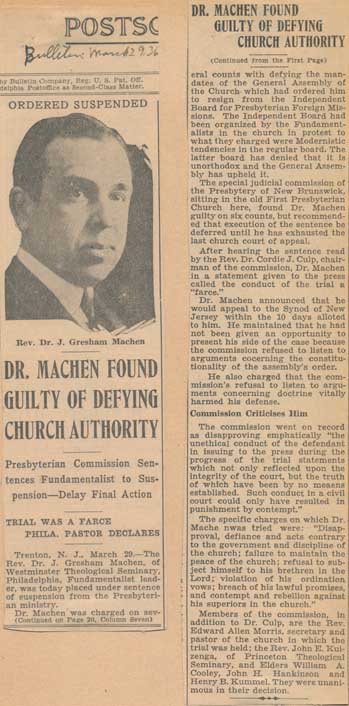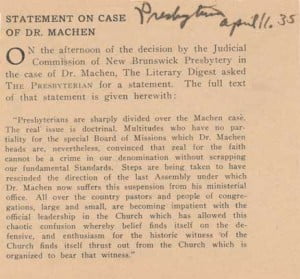The following sermon was delivered by the Rev. Daniel Dana on this day, March 31, in 1805. Checking the history books, it appears that the occasion of the sermon may have been an election in the State of Massachusetts. Any national election is ruled out as the concern of the sermon, since that had taken place the year before (1804). But regardless of the context, Rev. Dana’s sermon presents and applies Biblical truth to the political sphere, yet without party spirit or affiliation. The Rev. Daniel Dana [1771-1859] served several churches in Newburyport, Massachusetts over the course of his ministerial career, and also served briefly as president of Dartmouth College (1820-21). His sermon is presented here in a heavily edited form, so as to sketch out the substance of the sermon in short form.
The Importance of Virtue and Piety as Qualifications of Rulers.
 A Discourse delivered March 31, 1805.
A Discourse delivered March 31, 1805.
By Daniel Dana, A.M.
Newburyport: Printed by Edmund M. Blunt, 1805.
2 Samuel 23:3
“The God of Israel said, the Rock of Israel spake to me: He that ruleth over men, must be just, ruling in the fear of God.”
At a period of political agitation, like the present, the bare naming of a text like this, may possibly excite feelings which should be forever banished from the house of God. If, my brethren, I have any acquaintance with my own heart, every thing of this kind is far from my intentions. The gospel breathes peace and love; and so should every minister. For such an one to be a warm and angry disputant on politics, even in private, is to degrade himself, and dishonor his office. To render the pulpit an engine of exciting unhallowed and malignant passions, and blowing up the flame of party spirit, is a prostitution still more inexcusable. At the same time, it is obvious that the Bible exercises a commanding authority, and claims a controlling influence, over all our conduct, not only as men, and Christians, but as citizens; as subjects or administrators of civil government. It is a perfect and universal rule, not only of faith, but of practice; and this, in each condition and relation in which the providence of God has placed us. It is equally obvious, that it is the minister’s duty to declare the whole counsel of God, to keep back nothing which may be profitable to his hearers, but distribute to each a portion in due season.
The sentiment inculcated in the text, is then simply this: that Virtue and religion are most important qualifications of a civil Ruler.
 First. All must acknowledge that good laws are most essential to the welfare of a community, and tend greatly to its promotion. Were it not for the restraints imposed by wholesome statutes and regulations, the world would be filled with violence, confusion and misery. Mankind would degenerate into a savage state, and continually prey on the property and peace of one another. But by the influence of salutary laws, the selfish and cruel passions of men are coerced, the unruly kept in order, and the weak guarded against the violence of the strong. Now it is evident that such institutions can be rationally expected of those legislators only, who are men of virtuous principle; who feel a horror at vice, and an impartial desire to promote the cause of truth and goodness. At least, such only can be expected to befriend the best interests of society with zeal, with uniformity and perseverance.
First. All must acknowledge that good laws are most essential to the welfare of a community, and tend greatly to its promotion. Were it not for the restraints imposed by wholesome statutes and regulations, the world would be filled with violence, confusion and misery. Mankind would degenerate into a savage state, and continually prey on the property and peace of one another. But by the influence of salutary laws, the selfish and cruel passions of men are coerced, the unruly kept in order, and the weak guarded against the violence of the strong. Now it is evident that such institutions can be rationally expected of those legislators only, who are men of virtuous principle; who feel a horror at vice, and an impartial desire to promote the cause of truth and goodness. At least, such only can be expected to befriend the best interests of society with zeal, with uniformity and perseverance.
Secondly. The best laws will be useless, unless executed in their true spirit, with vigor and impartiality. If, like a sword in its scabbard, they lie neglected and forgotten, where will the virtuous find protection; or the wicked, their merited punishment?—One of the ancient philosophers compared laws to spiders’ webs, in which the small flies are entangled and perish, while the larger ones break through and escape. Such they are indeed, where the civil magistrate is destitute of the fear of God. Justice will too probably be bought and sold. The oppressor will either elude detection, or bid defiance to punishment. Perhaps the very enormity of his crimes will constitute his security. Vice will stalk through the land, unblushing, unappalled : while innocence, neglected and oppressed, will languish in penury. In a word, rulers will, in such a case, be the very reverse of what they ought—an encouragement to evil doers, and a terror to such as do well.
Thirdly. Civil rulers, those especially in high stations, have the power of filling various other offices of trust and importance. And it may generally be expected that they will thus elevate those whose characters are correspondent with their own. This is perfectly natural; though it may not take place in every particular instance.
Fourthly. The dignity and prosperity of a government depend much on the virtue and piety of those who administer it. There is something nobly commanding in the attitude assumed by those rulers who have maintained a pure conscience, and an unshaken integrity of conduct.
Fifthly. The example of rulers has an unspeakably important influence in forming the public morals and manners, and in disseminating virtue or vice through the community. Those must have little acquaintance with human nature, who are ignorant of the power of example. It is immense and incalculable.
Sixthly. The prayers of pious rulers are of incalculable importance and advantage to the people over whom they are placed. To deny the efficacy of prayer with the Almighty, would be to commence infidels and atheists at once.
Finally : may it not be rationally apprehended that the wrath of Heaven will fall with signal and overwhelming weight, on a people who, favored with the light of the gospel, the blessings of civil liberty, and the inestimable privilege of electing their own rulers, are yet regardless of their moral and religious character? Indeed the natural connexion between such inexcusable negligence, and almost every misery which can afflict society, is but too visible. Hence the wise man notes it as one of the most melancholy objects, even in such a disordered world as this : that he saw the place of judgment, that wickedness was there ; and the place of righteousness, that iniquity was there. Hence he likewise declares, that when the wicked rise, men hide themselves, (the best of men, not unfrequently;) but when they perish, the righteous increase.
A few additional reflections shall close the subject.
First. It directly results from what has been said, that Christianity has a most benign aspect on a republican government, and its institutions. In a government of this kind, as the people are the original fountain of all power, so their happiness, and not the aggrandizement of one, or of a few, is, or ought to be, the object of all the laws, and public institutions. To secure the accomplishment of this object, it is necessary that the people have wisdom enough to choose men of sound hearts and pure morals for their rulers.
A second remark. In proportion as vice and irreligion prevail among a people, they become of course incapable of self-government. If a sense of moral obligation be relaxed; if licentiousness in principle and practice pervade all classes in the community; if infidelity spread its poison in every circle; if religion, and its institutions be treated with open disregard and contempt; if the young grow up without instruction, and without virtue—what is the inevitable consequence? The best men, wearied with a fruitless struggle against corruption, will retire from the public service in despair, or be violently thrust from office. Unprincipled, selfish and ambitious spirits will seize the reins of power. The most precious institutions which the wisdom of man has devised, will gradually moulder away. And the liberties of such a people, after being awhile the sport of a few artful and daring leaders, fattening in succession on their spoils, will finally fall a sacrifice to some ambitious chief, more successful, and probably more abandoned, than the rest. Such is the progress—a sure and short one, and but too easily traced—from public corruption to public slavery and ruin. O my country! Would to Heaven thou wert aware of thy danger! Would to Heaven thou mightiest know the things of thy peace, before they be forever hidden from thine eyes!
Thirdly. Our subject intimates that the privilege secured to us by our constitutions of government, of electing our own rulers, is a highly important privilege, and should be wisely and conscientiously used. In this respect, we are favored above every other nation on which the sun looks down. It must, at the same time, be remembered that, as the best things, when perverted, become the worst; so this inestimable privilege, if abused, may turn to the bitterest of public evils. Let us then feel, my brethren, that we have an important part to act : and let none of us think so meanly of our birthright as Americans, as to let opportunities of exercising it pass neglected.—The elections of the ensuing day are confessedly of high importance. All pretensions to dictate to you the particular objects of your suffrages, I perfectly disclaim. Still, what properly belongs to my subject, and to a faithful discharge of ministerial duty in this connexion, I must not, I dare not suppress. Let me then remind you, that in the transaction contemplated, you will be as really and solemnly accountable to God, as in any other of your lives. His word has informed you who are the rulers approved by Him, and what are the qualifications which give rational hope that their possessor will prove a public blessing. It informs you too, on whom He will frown, and what is the administration which must be esteemed a public calamity. Open your hearts to the peculiar exigencies of the time. Attend to the imperious claims of this beloved country. Feel her interests as your own : and commit them to men of principle—of exemplary purity in private life—of open, unsuspected regard to religion—and whose patriotism appears less in plausible and flattering professions, than in costly sacrifices, and substantial services.
To conclude : I have addressed you, at this time, my brethren, on a subject at once delicate, and highly important. Observations have been offered, which to me appear most deeply, and most extensively interesting to our common country. but they have been all of a general aspect. I have made no applications. These I leave to your own minds and consciences : and I trust they will be faithful. Permit me likewise to appeal to all who now hear me, and ask, whether the things which have been imperfectly suggested, are not such as meet the assent of every impartial mind; and such as are amply warranted by explicit and repeated declarations of the sacred Scriptures? Nay further, are they not so obviously important to the honor of God, to the dearest interests of human society, and especially to those of our own country, that to pass them in entire silence, would, in a minister of the gospel, be criminal neglect? If they are not, let them have no weight with you. Let them pass by you like the idle wind which you respect not. And let me bow to the just and heavy censure which belongs to him who mistakes his place, and his duty. . . I close with commending this attempt to your candor, and to the blessing of Almighty God : praying that His own infallible Spirit may guide each of us into all truth, and all duty; supplicating too, that if it consist with His infinite wisdom, the happy period may soon arrive, when, in whatever pertains to the public good, we shall all be of one mind, and of one heart. To Him be glory forever.

 Trenton, N.J., March 29.—The Rev. J. Gresham Machen, of Westminster Theological Seminary, Philadelphia, Fundamentalist leader, was today placed under suspension from the Presbyterian ministry.
Trenton, N.J., March 29.—The Rev. J. Gresham Machen, of Westminster Theological Seminary, Philadelphia, Fundamentalist leader, was today placed under suspension from the Presbyterian ministry. On the afternoon of the decision by the Judicial Commission of New Brunswick Presbytery in the case of Dr. Machen, The Literary Digest asked The Presbyterian for a statement. The full text of that statement is given herewith:
On the afternoon of the decision by the Judicial Commission of New Brunswick Presbytery in the case of Dr. Machen, The Literary Digest asked The Presbyterian for a statement. The full text of that statement is given herewith: